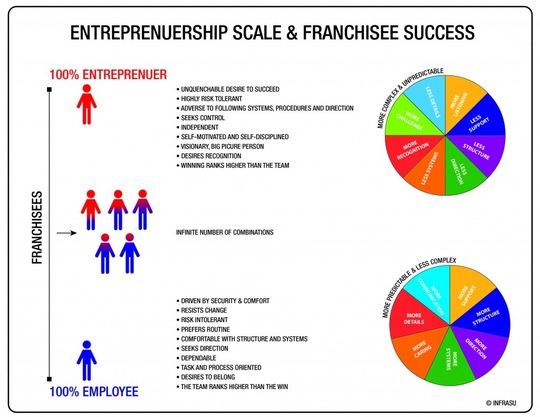Since the late 1970s franchising professionals have debated whether or not franchisees are entrepreneurs. The debate still goes on; some claim franchisees are just employees who buy themselves a job, while others claim franchisees are just entrepreneurs who choose to buy a business instead of building one. Some people base their argument on the literal definition of the term "entrepreneur" while others go further and take into consideration its connotations.
You may say that it all boils down to semantics, so who cares, right? Well, all franchisors should care. This is not a philosophical or academic question; it's a strategic and operational one.
The term "Entrepreneurship" is not restrictive and unyielding; instead it's fluid and flexible. In franchising, we must look at this term not as an absolute, but more as a scale, not as the literal definition, but more as the complex concept it captures. And, the success of your franchisees, as well as their ramp-up and satisfaction, depends on how well you understand what the Entrepreneurship Scale means to your system.
Franchisees, like all people, are complex beings--each one holds a different combination of personality traits, experiences, expertise, learning styles, preferences, strengths, weaknesses, beliefs systems, and habits that make them unique. To hold the perspective that all franchisees are entrepreneurs or that no franchisees are entrepreneurs is equally dangerous.
Both premises are oversimplifications that can take a franchisor in a totally wrong direction. Instead, consider that every franchisee falls on a different position on the Entrepreneurship Scale.
Thus their success greatly depends on how well you define and mold your business model, the franchise sales process, the training and support programs and the tools you incorporate in your business so as to address these differences. If you don't, successful results will remain a game of luck instead of one of skill. It's just that simple!
Although franchise success starts with a valid business model, the success of individual franchisees begins with a clear definition of that model as well as of your culture, and furthermore hinges on your proficiency at granting franchises to those people who better match your company. For example, franchisees who are closer to employees on the Entrepreneurship Scale tend to get better results in a company that has a highly supportive culture and a more structured model with stricter controls, clearer benchmarks, and systems.
On the other hand, those closer to the entrepreneur end of the scale will be more productive in less restrictive systems. So, if tight controls are important to you, a person closer to the ultimate employee will be a better match for your company.
The irony and challenge of franchising is that most franchisors search for individuals whose traits are closer to those held by the ultimate entrepreneur. Let's face it, most of us prefer to deal with people who are self-motivated and totally committed to success. These people move faster through the sales process and are quicker to make a decision. Yet, this type of individual is by nature more independent. Think about it, the people who are more likely to invest in your system are the same people who will be most prone to resist the system in which they invest. On the other hand, those people who tend to be better at following your system are less inclined to choose business ownership, and thus to invest in your franchise offering.
Although the success of individual franchisees starts with a good a match, it doesn't end there. No matter how hard we try or how many tools we use to benchmark and select franchisees, there is simply no way to ensure a perfect match every time. After all, we are dealing with people and the reactions of the most predictable of human beings can't be fully anticipated at all times and under all conditions.
This means that franchisees are always going to be a mix, some closer to our ideal combination and some farther away from it. Therefore the success of every single franchisee ultimately rests on how well you adapt your system, training, communications, and support to each individual so as to empower him or her to follow your system as closely as possible.
The ultimate paradox of franchising is that in order to get the consistency and uniformity inherent in franchising, we must use tailor-made training and support systems.
Franchisees who are closer to the ultimate employee end of the scale will require more support, more caring, more direction, and more coaching and communication in order for them to be able to absorb the information and apply it. On the other hand, franchisees who are closer to the ultimate entrepreneur will need less direction, more listening, less structure, and if you want to keep them from deviating from your system, you have to keep a closer eye on them since they will have a greater tendency to do their own thing which can damage your brand and also cause them to fail.
So, does the debate about whether franchisees are entrepreneurs or employees matter? You bet it does! Success in franchising is crafted, not something that just happens by pounding franchisees to follow the system. Understanding the nature of franchisees and how they learn is a crucial step in designing franchising systems that engender success.
The post Are Franchisees Entrepreneurs or Employees? Why Should You Care? appeared first on InFraSu.



